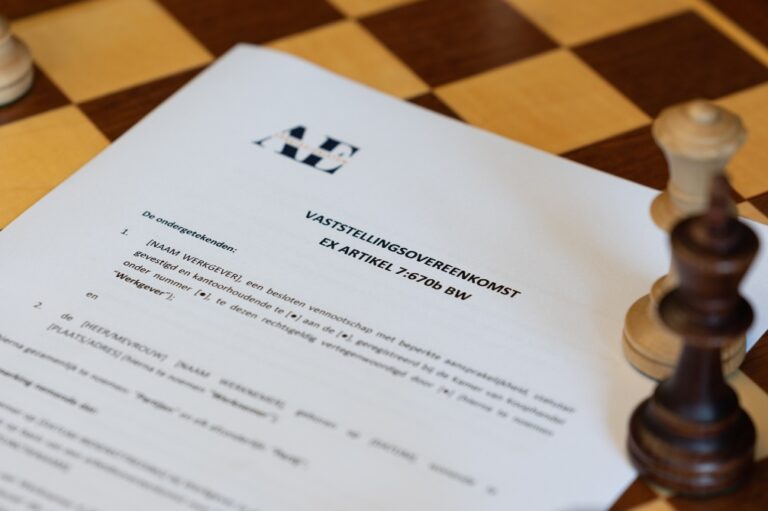
Vaststellingsovereenkomst en het behoud van een WW-uitkering
Hoe zorg je bij een vaststellingsovereenkomst voor behoud van een WW-uitkering? Wij leggen je het in dit artikel uit.
SETTLEMENT AGREEMENT


When an employer and an employee decide to terminate employment, a settlement agreement (VSO) is often drawn up. A crucial part of this agreement may be the exemption from work. But what exactly does this entail? In this blog, we explain what exemption from work in a settlement agreement means and what you, as an employee, should be aware of.
A settlement agreement, also known as a termination agreement, is a legal document in the Netherlands in which the employer and employee mutually agree on the terms for ending the employment contract. This is usually done without the intervention of a judge. Important parts of the VSO include the end date of employment, any severance pay, and agreements on the notice period.
Exemption from work means that after signing the settlement agreement, the employee no longer must work, while continuing to be paid wages until the official end date of the employment contract. This can take effect immediately after signing the VSO or later, depending on the agreements made.
When entering into a work release settlement agreement, it is essential to be aware of the terms. Pay attention to the following:
Exemption from work under a settlement agreement can have advantages, such as extra time and space to apply for jobs, but it can also have disadvantages, such as the loss of networking opportunities and a greater distance from the work field. It is crucial that employees carefully read and consider the terms of the VSO. If necessary, we can provide you with legal advice to ensure that the agreements made are reasonable! Please contact us for this.
Need advice?
Discover our recent blog articles

Vaststellingsovereenkomst en het behoud van een WW-uitkering
Hoe zorg je bij een vaststellingsovereenkomst voor behoud van een WW-uitkering? Wij leggen je het in dit artikel uit.

Vaststellingsovereenkomst bij burn-out: wat moet je weten?
Het dienstverband tijdens een burn-out beëindigen m.b.v. een vaststellingsovereenkomst. In dit artikel leggen wij uit wat je hierover moet weten.

Vaststellingsovereenkomst en het budget voor outplacement
In deze blog leggen we uit wat outplacement inhoudt, hoe je een budget hiervoor kunt regelen en waarom dit in jouw belang kan zijn bij het sluiten van een vso.

Arbeidsjurist Eindhoven is onderdeel van Adviesgroep Eindhoven. De one-stop-shop voor ondernemers, particulieren en expats.